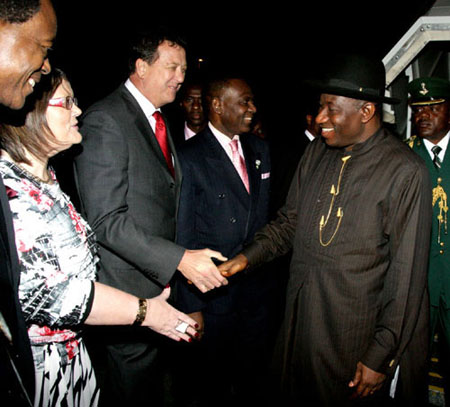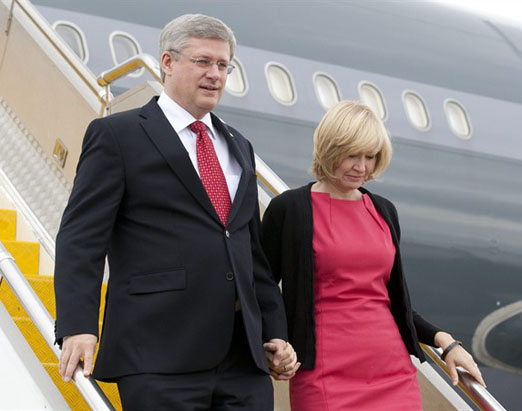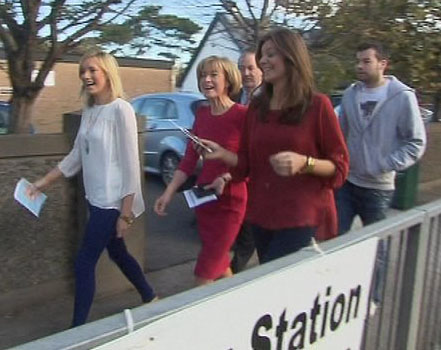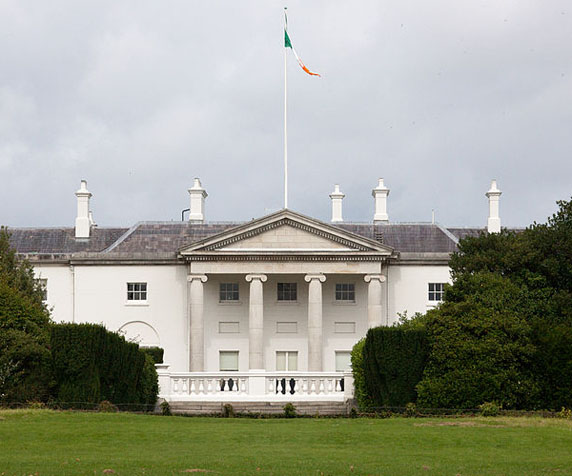Change in Commonwealth realms and Irish presidential election .. two straws in the wind for the Canadian future
Oct 27th, 2011 | By Randall White | Category: Canadian Republic
President Goodluck Jonathan of Nigeria arrives in Perth, Western Australia, for the 2011 Commonwealth Heads of Government Meeting (CHOGM).
[UPDATED OCTOBER 29]. TORONTO, ONTARIO, CANADA. THURSDAY, OCTOBER 27, 2011. 3PM ET. Two different events far away today (allowing that this is a slippery word in the contemporary global village) have somewhat ironically juxtaposed implications for the long-term Canadian future. Even if the Canadian mainstream media is paying remarkably little attention!
“Today” viewed as Friday, October 28, Queen Elizabeth II officially opens the 54-nation Commonwealth Heads of Government Meeting (CHOGM) at the Perth Convention and Exhibition Centre in Western Australia. Australian Labor Party “Prime Minister Julia Gillard will lead talks with her Commonwealth counterparts on how to reform and reinvigorate the beleaguered body but isn’t talking up the prospects of a breakthrough.”

Prime Minister Stephen Harper (and better half) arrive in Perth, Western Australia, for the 2011 Commonwealth Heads of Government Meeting (CHOGM).
At the same time, it seems clear enough that the United Kingdom and the 15 other so-called “Commonwealth realms” that still recognize the British monarch as a formal or symbolic head of state will agree on UK Prime Minister David Cameron’s proposal to change the more than 300-year-old rules of monarchical succession. In particular Cameron wants to change the rules that forbid first-born daughters from succeeding to the throne over second-born sons, and (it would seem) also the rules that require heirs to the throne to marry within the Church of England. [UPDATE OCTOBER 29: I confess to some confusion on this last point. But it has now been reported that all the Commonwealth realms have approved Mr. Cameron’s proposal. The resulting change in the law will apparently abolish both the male succession rule, and a rule which forbids those who wish to remain in the line of succession to marry Roman Catholics. It will not, however, abolish the rule which requires British monarchs themselves to remain within the Church of England, since the monarch will continue as Head of the Church as well as Head of State. Some argue that confusing prospects linger: what happens, eg, if the eldest child of the monarch is raised a Catholic – or for that matter a Buddhist, Hindu, Jew or Muslim, or even a Baptist, etc? I remain somewhat confused on the religious angle myself. If you do as well, join the club! For some degree of clarification see, eg: “British Monarchy Scraps Rule of Male Succession in New Step to Modernization” and “In praise of equality on the throne.”]
In Canada, as elsewhere, there are those who believe PM Cameron’s proposal will finally have some quite unintended consequences. These long overdue adjustments in succession rules mark the first change of its sort in the British monarchy in more than three centuries. And, in all the surviving Commonwealth realms (again quite unintentionally), this arguably opens a door to the kind of “implementation of instituting a Canadian head of state popularly elected and sever formal ties with the British Crown,” currently proposed by the Young Liberals of Canada.

Candidate Mary Davis (centre) votes in Irish presidential election today, at the Burrow School in Sutton.
Meanwhile, on “today” viewed as Thursday, October 27, an event on the other side of the Atlantic Ocean ought to be of considerable interest for those Canadians who wonder just what “a Canadian head of state popularly elected,” to replace the British monarch, might actually look like in the real world. More exactly, the people of the former self-governing British dominion of Ireland are going to the polls to chose a ceremonial head of state called a president.
In fact, unlike that of the USA (or France), the “Irish presidency is largely a symbolic role … Apart from the ‘soft authority’ a directly elected president can exercise, there are constitutional restrictions on what he or she can say and do.” The Irish President is “a purely symbolic post that holds no executive power.” The office descends directly from the old office of Irish Governor General. And the official residence of the Irish President today (Ãras an Uachtaráin) was an official residence of Irish Governor Generals in days now long gone by. When the office was first established in 1937, many predicted that such a popularly elected ceremonial head of state would ultimately wreak havoc in the Westminster or British-style parliamentary democracy that even the new Republic of Ireland continued to embrace. But history has proved this prediction altogether wrong.

Ãras an Uachtaráin, official residence of Irish President today, former official residence of Irish Governor General (not unlike Rideau Hall in Canada?).
Of course, the Irish experience at large has long been viewed as a dubious outlier in the more conservative international “Anglosphere” to which, eg, Prime Minister Stephen Harper in Canada is so strongly attached. (To some extent sometimes, perhaps, for a few good reasons: “What is so special about Irishmen who get Alzheimer’s,” as the current version of the joke has it? And the answer is: “They still never forget their grievances” – and still never seem to tire of talking about them, over and over again.) On some parallel trajectory, and as the 1999 referendum on a different kind of replacement for the British monarch in Australia illustrated, the now almost 75-year-old and very workable Irish precedent of a popularly elected ceremonial head of state in a republican Westminster parliamentary democracy has frequently been overlooked.
In Canada we will also want to create our own version of what the Young Liberals are calling “a Canadian head of state popularly elected” – suited to our particular circumstances (which are in many respects quite different from those of Ireland , and more similar, to take just one of several other cases in point, to the present-day Commonwealth republic of India). But the current Irish presidential election – which features seven different candidates, including a former IRA commander – is lively and intriguing. In the interest of our own future beyond the British monarchy we almost certainly ought to be paying more attention to it than we are. If you actually do want to get started, try: “Candidates vote in Presidential Election” ; “Polls open for presidential election” ; “Surprises still possible in Irish presidential election” ; and “Irish presidency: candidates go from sinner to saint.” Rumour has it that we should know the final results this weekend.
